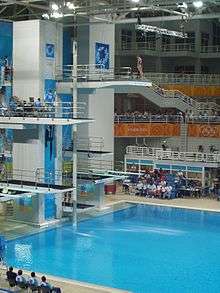Diving at the 2004 Summer Olympics
At the 2004 Summer Olympics, in Athens, eight diving events were contested during a competition that took place at the Olympic Aquatic Centre, from 20 to 28 August (14 and 16 August for the synchronized events),[1] comprising a total of 129 divers from 30 nations.[2]
| Diving at the Games of the XXVIII Olympiad | |
|---|---|
 | |
| Venue | Olympic Aquatic Centre |
| Dates | 20 – 28 August 2004 |
| Competitors | 129 from 30 nations |
| Diving at the 2004 Summer Olympics | ||
|---|---|---|
 | ||
| 3 m springboard | men | women |
| 10 m platform | men | women |
| Synchronized 3 m springboard | men | women |
| Synchronized 10 m platform | men | women |
Medal summary

View of the diving platforms at the Olympic Aquatic Centre in Athens, during the 2004 Summer Olympics.
Men
| Event | Gold | Silver | Bronze |
|---|---|---|---|
| 3 m springboard |
Peng Bo |
Alexandre Despatie |
Dmitri Sautin |
| 10 m platform |
Hu Jia |
Mathew Helm |
Tian Liang |
| Synchronized 3 m springboard |
Thomas Bimis and Nikolaos Siranidis |
Tobias Schellenberg and Andreas Wels |
Steven Barnett and Robert Newbery |
| Synchronized 10 m platform |
Tian Liang and Yang Jinghui |
Peter Waterfield and Leon Taylor |
Mathew Helm and Robert Newbery |
Women
| Event | Gold | Silver | Bronze |
|---|---|---|---|
| 3 m springboard |
Guo Jingjing |
Wu Minxia |
Yulia Pakhalina |
| 10 m platform |
Chantelle Michell |
Lao Lishi |
Loudy Tourky |
| Synchronized 3 m springboard |
Wu Minxia and Guo Jingjing |
Vera Ilina and Yulia Pakhalina |
Irina Lashko and Chantelle Newbery |
| Synchronized 10 m platform |
Lao Lishi and Li Ting |
Natalia Goncharova and Yulia Koltunova |
Blythe Hartley and Émilie Heymans |
Medal table
| Rank | Nation | Gold | Silver | Bronze | Total |
|---|---|---|---|---|---|
| 1 | 6 | 2 | 1 | 9 | |
| 2 | 1 | 1 | 4 | 6 | |
| 3 | 1 | 0 | 0 | 1 | |
| 4 | 0 | 2 | 2 | 4 | |
| 5 | 0 | 1 | 1 | 2 | |
| 6 | 0 | 1 | 0 | 1 | |
| 0 | 1 | 0 | 1 | ||
| Totals (7 nations) | 8 | 8 | 8 | 24 | |
Participating nations
Here are listed the nations that were represented in the diving events and, in brackets, the number of national competitors.
|
|
gollark: no.
gollark: Check out my cool project!http://localhost:3030
gollark: () => (state, actions) => { if (state.websocket.readyState === 1) { // socket is open console.log("SEND", x) state.websocket.send(CBOR.encode(x)) } else { actions.addMessage(["error", "Open connection before sending messages."]) } }
gollark: umnkios => umnikos => umm... something
gollark: I think in Judaism you're not meant to destroy documents with names of God on them, for some reason.This weirdness causes problems in our modern times, given edge cases like: does deleting documents containing that on a *computer* count?
References
- "Diving schedule". Athens 2004. Rediff.com. Retrieved 5 February 2007.
- "Diving at the 2004 Summer Olympics". Olympedia. Retrieved 26 May 2020.
External links
This article is issued from Wikipedia. The text is licensed under Creative Commons - Attribution - Sharealike. Additional terms may apply for the media files.